Tag: literary prizes
Graphic success
10 May 2012 | In the news
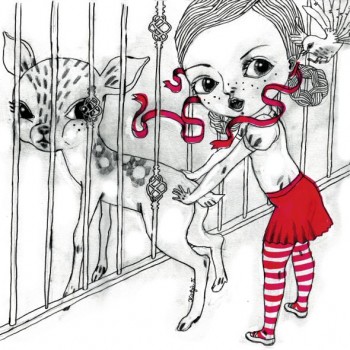
Finnish Comics Annual: picture by Katja Tukiainen
The 2012 Finnish Comics Annual, edited by Reija Sann, was published in May by HuudaHuuda and the Finnish Comics Association. The book focuses on everyday realism, featuring eleven artists: Terhi Ekebom, Grönroos & Rantio, Matti Hagelberg, Pauli Kallio, Tarmo Koivisto, Mika Lietzen, Petteri Tikkanen, Tiitu Takalo, Katja Tukiainen and Riitta Uusitalo. In their work the limits of the individual and the collective, the local and the universally human are explored by means of fantasy.
The first Finnish Comics Annual, featuring Finnish comics and graphic novels in English, was published last year. The editor was Ville Hänninen.
This year’s Finlandia Comics Prize, worth €5,000, awarded by the association Tampere Kuplii (‘Tampere bubbles’) at a comics festival of the same name in Tampere on 4 May, went to graphic designer and illustrator Ville Tietäväinen for his voluminous graphic novel Näkymättömät kädet (‘Invisible hands’, WSOY, 2011). Ten finalists were chosen by a jury out of 68 candidates, and the final choice was made by actor Armi Toivanen.
Näkymättömät kädet is the story of a Moroccan tailor, Rashid, who loses his job and has to leave his family to look for work in Europe. For an illegal alien life in Spain is unbearably difficult. Introducing the work in the article ‘Funny peculiar’ (there is also a sample from Tietäväinen’s work) Heikki Jokinen comments: ‘Through the story of one person, Tietäväinen speaks of important matters: poverty, human value and what keeps us going, hope.’
Beautiful books
9 March 2012 | In the news
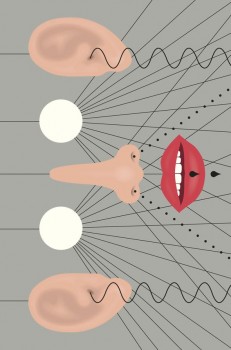
Design: Markus Pyörälä. The cover of Runojä (‘Poemms’) by Harry Salmenniemi
The Finnish Book Art Committee chooses the most beautiful books of the year from various categories of publications, and awards the prize of the Most Beautiful Book of the Year.
Graphic design, typography, cover and binding are all taken into consideration. Honorary diplomas are awarded to the designers, publishers, printers and other production units of the prize-winning books.
The Finnish Fair Foundation makes an annual grant to the Finnish Book Art Committee, which works in cooperation with the National Library of Finland. Representatives from various fields participate in the work of the juries. The prizes has been awarded since 1947.
This year the Most Beautiful Book of the Year was a collection of poetry by Harry Salmenniemi, Runojä (Runoja, ‘Poems’, deliberately misspelt in the title – ‘Poemms’?). The graphic designer is Markus Pyörälä, the publisher, Otava.
The jury commented: ‘Just as in the poetry itself, all the senses are engaged on the cover. The typography, so instrumental to prose poetry, provides structure and surprises…. All traditional beauty is there too: the tender touch of the paper, the snappy binding and the skillfully chosen fonts. Gold on the cover, overall, platinum.’
Henriikka Tavi wins the Dancing Bear Poetry Prize
1 March 2012 | In the news
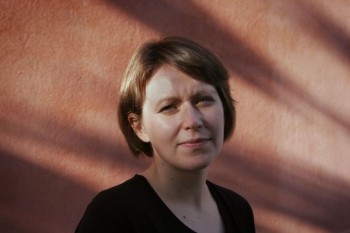
Henriikka Tavi. Photo: Heini Lehväslaiho
The Dancing Bear Poetry Prize, worth €3,500, is awarded annually by the Finnish Broadcasting Company to a book of poetry published the previous year. The prize has been awarded since 1994.
This year’s winner – announced on 27 February – was Henriikka Tavi for her new collection, Toivo (‘Hope’, Teos; see the selection of her poems, translated by David Hackston, we published in December, as well as the introduction by Mervi Kantokorpi).
According to the jury, Tavi’s Toivo, reflecting and contemplating sorrow and loss with its childlike imagery of lullabies and butterflies, creates a feeling of togetherness we all need.
The winner was selected by a jury of two journalists, Tarleena Sammalkorpi and Marit Lindqvist and the poet Ilpo Tiihonen. The other shortlisted poets were Kristian Blomberg, Suvi Valli, Markku Into, Harry Salmenniemi and Wava Stürmer.
In addition to the Dancing Bear Poetry Prize, the Finnish Broadcasting Company also awards a prize for the best poetry translation; this year it went to poet Caj Westerberg for his excellent poetry translations from the past two decades of the Swedish poet Tomas Tranströmer.
The novel that won: the Runeberg Prize 2012
9 February 2012 | In the news
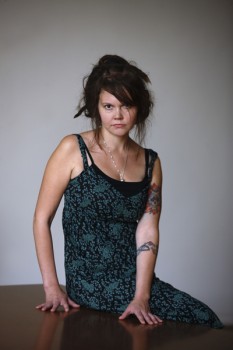
Katja Kettu. Photo: WSOY
The Runeberg Prize for fiction, awarded this year for the twenty-sixth time, went to Katja Kettu for her third novel, Kätilö (‘The midwife’, WSOY).
Kettu (born 1978) is a writer and director of animated films. The prize, worth €10,000, was awarded on 5 February – the birthday of the poet J.L Runeberg (1804–1877) – in the southern Finnish city of Porvoo.
The jury – representing the prize’s founders, the Uusimaa newspaper, the city of Porvoo, both the Finnish and Finland-Swedish writers’ associations and the Finnish Critics’ Association – chose the winner from a shortlist of eight books. The jury was particularly impressed by the rich language of Kettu’s novel, set in the Lapp War of 1944–45, and the colourful portrayal of the characters.
The other seven finalists were a collection of essays and poems, Magnetmemoarerna, by Ralf Andtbacka (‘Magnet memoirs’, Ellips), the novel Tusenblad, en kvinna som snubblar (‘Millefeuille, the woman who stumbles’, Schildts), the novel Gisellen kuolema (‘Giselle’s death’, Robustos) by Siiri Eloranta, two collections of poems, Aallonmurtaja (‘The breakwater’, Otava) by Pauliina Haasjoki and De bronsblå solarna (‘The bronze-blue suns’, Söderströms) by Kurt Högnäs, a collection of short stories by Joni Pyysalo, entitled Ja muita novelleja (‘And other stories’, WSOY) and the novel Paljain käsin (‘With bare hands’, Gummerus) by Essi Tammimaa.
A Finnish comics award
2 February 2012 | In the news

Kaisa Leka
Suomen sarjakuvaseura (The Finnish Comics Society) has awarded its Puupäähattu Award 2012 to the graphic artist and illustrator Kaisa Leka.
The prize is not money but a honorary hat, and is named after a classic Finnish cartoon character, Pekka Puupää (‘Pete Blockhead’), created by Ola Fogelberg and his daughter Toto. The Puupää comic books were published between 1925 and 1975, and some of the stories were made into film.
Leka describes herself as a mouse named Kaisa. Both of her legs have been replaced with steel prostheses, and she has featured disability in her comics book, for example in I Am Not These Feet.
Artificial limbs haven’t stopped her from cycling, for example, from Finland to Nice in France; she has described this tour in her book entitled Tour d’Europe.
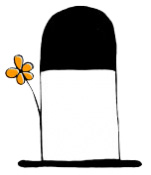
The award: Puupäähattu (‘Blockhead hat’)
(See a video of Kaisa cycling, by Lina Jelanski.)
Finlandia Junior Prize 2011
7 December 2011 | In the news
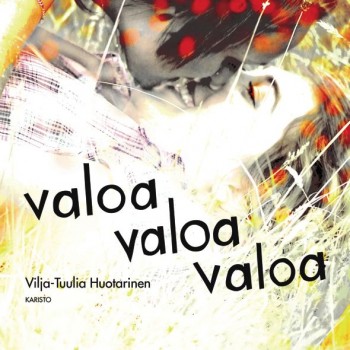 The musician Paula Vesala has chosen, from a shortlist of six, a book for young people by the poet Vilja-Tuulia Huotarinen, Valoa valoa valoa (‘Light light light’, Karisto). The story, which is set at the time of the Chernobyl nuclear power station disaster, poetically describes the passion and pain of first love, longing for mother and death.
The musician Paula Vesala has chosen, from a shortlist of six, a book for young people by the poet Vilja-Tuulia Huotarinen, Valoa valoa valoa (‘Light light light’, Karisto). The story, which is set at the time of the Chernobyl nuclear power station disaster, poetically describes the passion and pain of first love, longing for mother and death.
‘Not just what is told, but how it is told. The rythm and timbre of Vilja-Tuulia Huotarinen’s language are immensely beautiful. Her phrases do not exist merely to tell the story, but live like poetry or song. Valoa valoa valoa does not incline toward young people from the world of adults; rather, its voice comes, direct and living, from painful, confusing, complex youth, in which young people should really be protected from adults and their blindness. I would have liked to read this book when I was fourteen,’ commented Vesala.
The other five shortlisted books were a picture book for small children, Rakastunut krokotiili (‘Crocodile in love’, Tammi) by Hannu Hirvonen & Pia Sakki, a philosophical picture book about being different and courageous entitled Jättityttö ja Pirhonen (‘Giant girl and Pirhonen’, Tammi) by Hannele Huovi and Kristiina Louhi; a dystopic story set in the 2300s, Routasisarukset (‘Sisters of permafrost’, WSOY), by Eija Lappalainen & Anne Leinonen; a novel about the war experiences of an Ingrian family, Kaukana omalta maalta (‘Far away from homeland’, WSOY) by Sisko Latvus and an illustrated book about gods and myths of the world, Taivaallinen suurperhe (‘Extended heavenly family’, Otava) by Marjatta Levanto & Julia Vuori.
The prize, awarded by the Finnish Book Foundation on 23 November, is worth €30,000.
Finlandia Prize for Fiction 2011
1 December 2011 | In the news
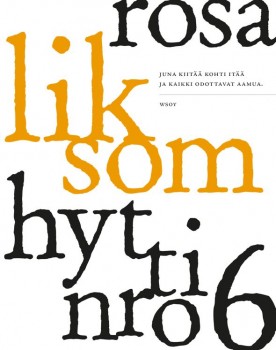 The winner of the Finlandia Prize for Fiction 2011, worth €30,000, is Rosa Liksom, for her novel Hytti no 6 (‘Compartment number 6’, WSOY): read translated extracts and an introduction of the author here on this page.
The winner of the Finlandia Prize for Fiction 2011, worth €30,000, is Rosa Liksom, for her novel Hytti no 6 (‘Compartment number 6’, WSOY): read translated extracts and an introduction of the author here on this page.
The prize was awarded on 1 December. The winner was selected by the theatre manager Pekka Milonoff from a shortlist of six.
‘Hytti nro 6 is an extraordinarily compact, poetic and multilayered description of a train journey through Russia. The main character, a girl, leaves Moscow for Siberia, sharing a compartment with a vodka-swilling murderer who tells hair-raising stories about his own life and about the ways of his country. – Liksom is a master of controlled exaggeration. With a couple of carefully chosen brushstrokes, a mini-story, she is able to conjure up an entire human destiny,’ Milonoff commented.
Author and artist Rosa Liksom (alias Anni Ylävaara, born 1958), has since 1985 written novels, short stories, children’s book, comics and plays. Her books have been translated into 16 languages.
Appointed by the Finnish Book Foundation, the prize jury (journalist and critic Hannu Marttila, journalist Tuula Ketonen and translator Kristiina Rikman) shortlisted the following novels: Kallorumpu (‘Skull drum’, Teos) by Eeva-Kaarina Aronen, William N. Päiväkirja (‘William N. Diary’, Otava) by Kristina Carlson, Huorasatu (‘Whore tale’, Into) by Laura Gustafsson, Minä, Katariina (‘I, Catherine’, Otava) by Laila Hirvisaari, and Isänmaan tähden (‘For fatherland’s sake’, first novel; Teos) by Jenni Linturi.
Rosa Liksom travelled a great deal in the Soviet Union in the 1980s. She said she hopes that literature, too, could play a role in promoting co-operation between people, cultures and nations: ‘For the time being there is no chance of some of us being able to live on a different planet.’
Government Prize for Translation 2011
24 November 2011 | In the news
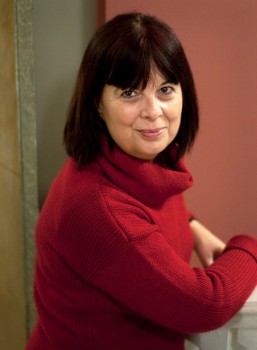
María Martzoúkou. Photo: Charlotta Boucht
The Finnish Government Prize for Translation of Finnish Literature of 2011 – worth € 10,000 – was awarded to the Greek translator and linguist María Martzoúkou.
Martzoúkou (born 1958), who lives in Athens, where she works for the Finnish Institute, has studied Finnish language and literature as well as ancient Greek at the Helsinki University, where she has also taught modern Greek. She was the first Greek translator to publish translations of the Finnish epic, the Kalevala: the first edition, containing ten runes, appeared in 1992, the second, containing ten more, in 2004.
‘Saarikoski was the beginning,’ she says; she became interested in modern Finnish poetry, in particular in the poems of Pentti Saarikoski (1937–1983). As Saarikoski also translated Greek literature into Finnish, Martzoúkou found herself doubly interested in his works.
Later she has translated poetry by, among others, Tua Forsström, Paavo Haavikko, Riina Katajavuori, Arto Melleri, Annukka Peura, Pentti Saaritsa, Kirsti Simonsuuri and Caj Westerberg.
Among the Finnish novelists Martzoúkou has translated are Mika Waltari (five novels; the sixth, Turms kuolematon, The Etruscan, is in the printing press), Väinö Linna (Tuntematon sotilas, The Unknown Soldier) and Sofi Oksanen (Puhdistus, Purge).
María Martzoúkou received her award in Helsinki on 22 November from the minister of culture and sports, Paavo Arhinmäki. Thanking Martzoúkou for the work she has done for Finnish fiction, he pointed out that The Finnish Institute in Athens will soon publish a book entitled Kreikka ja Suomen talvisota (‘Greece and the Finnish Winter War’), a study of the relations of Finland and Greece and the news of the Winter War (1939–1940) in the Greek press, and it contains articles by Martzoúkou.
The prize has been awarded – now for the 37th time – by the Ministry of Education and Culture since 1975 on the basis of a recommendation from FILI – Finnish Literature Exchange.
Jarkko Laine Prize 2011
1 June 2011 | In the news
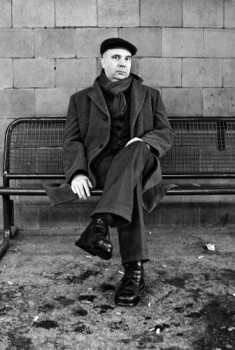
Juha Kulmala. Photo: Lotta Djupsund
The Jarkko Laine Literary Prize (see our news from 6 May), worth €10,000, was awarded to Juha Kulmala (born 1962) on 19 May for his collection of poems entitled Emme ole dodo (‘We are not dodo’, Savukeidas, 2009).
The prize is awarded to a ‘challenging new literary work’ published during the previous two years. Shortlisted were also two novels, Kristina Carlson’s Herra Darwinin puutarhuri (‘Mr Darwin’s gardener’, Otava, 2009) and Erik Wahlström’s Flugtämjaren (‘Fly tamer’, Finnish translation Kärpäsenkesyttäjä, Schildts, 2010).
Jarkko Laine (1947–2006) was a poet, writer, playwright, translator, long-time editor of the literary journal Parnasso and chair of the Finnish Writers’s Union.
Best Translated Book Award 2011
13 May 2011 | In the news
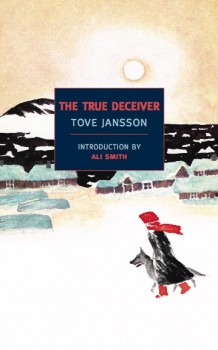 Thomas Teal’s translation from Swedish into English of Tove Jansson’s novel Den ärliga bedragaren (Schildts, 1982), entitled The True Deceiver (published by New York Review Books, 2009), won the 2011 Best Translated Book Award in fiction (worth $5,000; supported by Amazon.com). The winning titles and translators for this year’s awards were announced on 29 April in New York City as part of the PEN World Voices Festival.
Thomas Teal’s translation from Swedish into English of Tove Jansson’s novel Den ärliga bedragaren (Schildts, 1982), entitled The True Deceiver (published by New York Review Books, 2009), won the 2011 Best Translated Book Award in fiction (worth $5,000; supported by Amazon.com). The winning titles and translators for this year’s awards were announced on 29 April in New York City as part of the PEN World Voices Festival.
Organised by Three percent (the link features a YouTube recording from the award ceremony, introducing the translator, Thomas Teal [fast-forward to 7.30 minutes]) at the University of Rochester, and judged by a board of literary professionals, the Best Translated Book Award is ‘the only prize of its kind to honour the best original works of international literature and poetry published in the US over the previous year’. ‘Subtle, engaging and disquieting, The True Deceiver is a masterful study in opposition and confrontation’, said the jury.
Tove Jansson (1914–2001), mother of the Moomintrolls, story-teller and illustrator of children’s books, translated into 40 languages, began to write novels and short stories for adults in her later years. Psychologically sharp studies of relationships, they are written with cool understatement and perception.
Quality writing will work its way into a wider knowledge (i.e. a bigger language and readership) eventually… even though occasionally it may seem difficult to know where exactly it comes from; in a review published in the London Guardian newspaper, the eminent writer Ursula K. Le Guin assumed Tove Jansson was Swedish.
New literary prize
6 May 2011 | In the news
A new literary prize was founded in 2010 by an association bearing the name of Jarkko Laine (1947–2006) – poet, writer, playwright, translator, long-time editor of the literary journal Parnasso and chair of the Finnish Writers’s Union.
The Jarkko Laine Literary Prize will be awarded to a ‘challenging new literary work’ published during the previous two years. The jury, of nine members, will announce the winner on 19 May.
The shortlist for the first prize is made of Kristina Carlson’s novel Herra Darwinin puutarhuri (‘Mr Darwin’s gardener’, Otava, 2009), Juha Kulmala’s collection of poems, Emme ole dodo (‘We are not dodo’, Savukeidas, 2009) and Erik Wahlström’s novel Flugtämjaren (‘Fly tamer’, Finnish translation Kärpäsenkesyttäjä, Schildts, 2010).
The prize money, €10,000, comes jointly from the publishing houses Otava, Otavamedia and WSOY, the Haavikko Foundation, the City of Turku and the University of Turku.
The Tollander Prize to Ulla-Lena Lundberg
17 February 2011 | In the news
One of the biggest literary prizes in Finland is the Tollander Prize, awarded annually on 5 February, the birthday of he national poet J.L. Runeberg, by Svenska litteratursällskapet i Finland (the Society of Swedish Literature in Finland). The prize is worth €35,000.
The recipient of the 2011 Tollander Prize is Ulla-Lena Lundberg, a versatile writer of novels, short stories, poems and travel essays. ‘She moves freely in different landscapes, times and cultures, finding universality in locality, whether on the island of Kökar in Åland, in Africa or in Siberia’, said the jury.
Written between 1989 and 1995, Lundberg’s fictional trilogy of Leo, Stora världen (‘The big world’) and Allt man kan önska sig (‘Everything one can wish for’), focused on the seafaring history and evolution of shipping in the Finnish Åland islands. Her autobiographical work Sibirien (Siberia’, 1993) has been published in German, Danish and Dutch.
Read the extracts from her latest book, Jägarens leende (‘Smile of the hunter’, 2010), on rock art, reviewed on our pages by Pia Ingström.
Winning stories of alternative realities
10 February 2011 | In the news
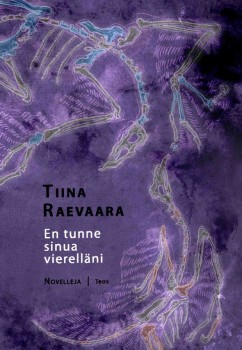 The Runeberg Prize for fiction, awarded this year for the twenty-fifth time, went to a collection of short stories by Tiina Raevaara.
The Runeberg Prize for fiction, awarded this year for the twenty-fifth time, went to a collection of short stories by Tiina Raevaara.
Her En tunne sinua vierelläni (‘I don’t feel you beside me’, Teos, 2010) mixes fantasy and realism, dealing with, for example, animal kingdom, human mind and artificial intelligence. See the introduction and translation of a story which we ran here on the Books from Finland website.
Raevaara (born 1979) holds a doctorate in genetics; the prizewinner is her second work of fiction. The prize, worth €10,000, was awarded on 5 February – the birthday of the poet J.L Runeberg (1804–1877) – in the southern Finnish city of Porvoo.
The jury – representing the prize’s founders, the Uusimaa newspaper, the city of Porvoo, both the Finnish and Finland-Swedish writers’ associations and the Finnish Critics’ Association – chose the winner from a shortlist of eight books: a collection of poetry, Vagga liten vagabond (‘Swing, little wanderer’, Söderströms) by Eva-Stina Byggmästar, the novel Poikakirja (‘Boys’ Own Book’, Otava) by Olli Jalonen, the novel Kiimakangas (WSOY) by Pekka Manninen, two collections of essays, Kuka nauttii eniten (‘Who enjoys most’) by Tommi Melender and Halun ja epäluulon esseet (‘The essays of desire and suspicion’) by Antti Nylén (both publlished by Savukeidas), a collection of poetry, Texas, sakset (‘Texas, scissors’, Otava) by Harry Salmenniemi and another collection of short stories, Apatosauruksen maa (‘The land of the apatosaurus’, WSOY) by Miina Supinen.
Science book of the year
13 January 2011 | In the news
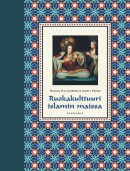 A book on Islamic cuisine and food culture by Helena Hallenberg and Irmeli Perho has won the prize for the Finnish science book of the year (Vuoden tiedekirja), worth €10,000. The prize is awarded by the Suomen Tiedekustantajien Seura, Finnish Science Publishers’ Association, and Tieteellisten seurain valtuuskunta, Federation of Finnish Learned Societies.
A book on Islamic cuisine and food culture by Helena Hallenberg and Irmeli Perho has won the prize for the Finnish science book of the year (Vuoden tiedekirja), worth €10,000. The prize is awarded by the Suomen Tiedekustantajien Seura, Finnish Science Publishers’ Association, and Tieteellisten seurain valtuuskunta, Federation of Finnish Learned Societies.
Ruokakulttuuri islamin maissa (‘Food culture in Islamic countries’, Gaudeamus) explores both cultural and culinary history in the Near East and other Islamic countries since the sixth century, from the Prophet Muhammad to this day – and yes, the book also contains recipes. Both the authors are academics: Hallenberg is a scholar of Islamic saints and Chinese Muslims’ ideas of health, while Perho specialises in Islamic history of ideas and society.
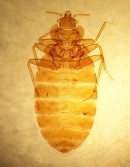
Cimex lectularius: the bedbug. Photo: Wikipedia
And a honorary mention, worth €2,500, was awarded to a large work, with excellent illustrations, on Heteroptera, an extensive family of bugs, one of which is the bedbug – luckily unknown to most of us. The vast majority of people have no idea, either, of the fact that there are 22 endangered species of these bugs in Finland, the home of 507 different representatives of the Heteroptera family. So, Suomen luteet – johdatus luteiden mielenkiintoiseen maailmaan by Teemu Rintala and Veikko Rinne (‘The bugs of Finland – an introduction to the interesting world of the Heteroptera’, Tibiale) is a lively proof of the amazing biodiversity of Finland.
Winner of the Susan Sontag Prize
25 December 2010 | In the news
The Susan Sontag Foundation was established in New York in 2004 in memory of the celebrated author and cultural journalist Susan Sontag (1933–2004). The Foundation grants a prize to a young American who translates from other languages into English. In 2010 the prize was awarded for the third time.
Benjamin Mier-Cruz is currently pursuing his PhD in Scandinavian Languages and Literatures at University College Berkeley, with a particular interest in Finland-Swedish modernism and German expressionist poetry. His winning translation proposal is entitled Modernist Missives of Elmer Diktonius – Letters and Poetry of Elmer Diktonius.
Elmer Diktonius (1896–1961) was a rebellious Finland-Swedish avant-garde poet and composer, who was fluent in Finnish as well as his native Swedish. His letters to a wide range of European authors and critics, written between 1919 (the year of the Finnish Civil War) and 1951, reflect the political, artistic and personal developments in Finland and Europe.
The prize ceremony took place first in Helsinki on 5 November in a seminar at the Svenska litteratursällskapet i Finland (the Society of Swedish Literature in Finland), then at Scandinavia House, New York, on 12 November.
